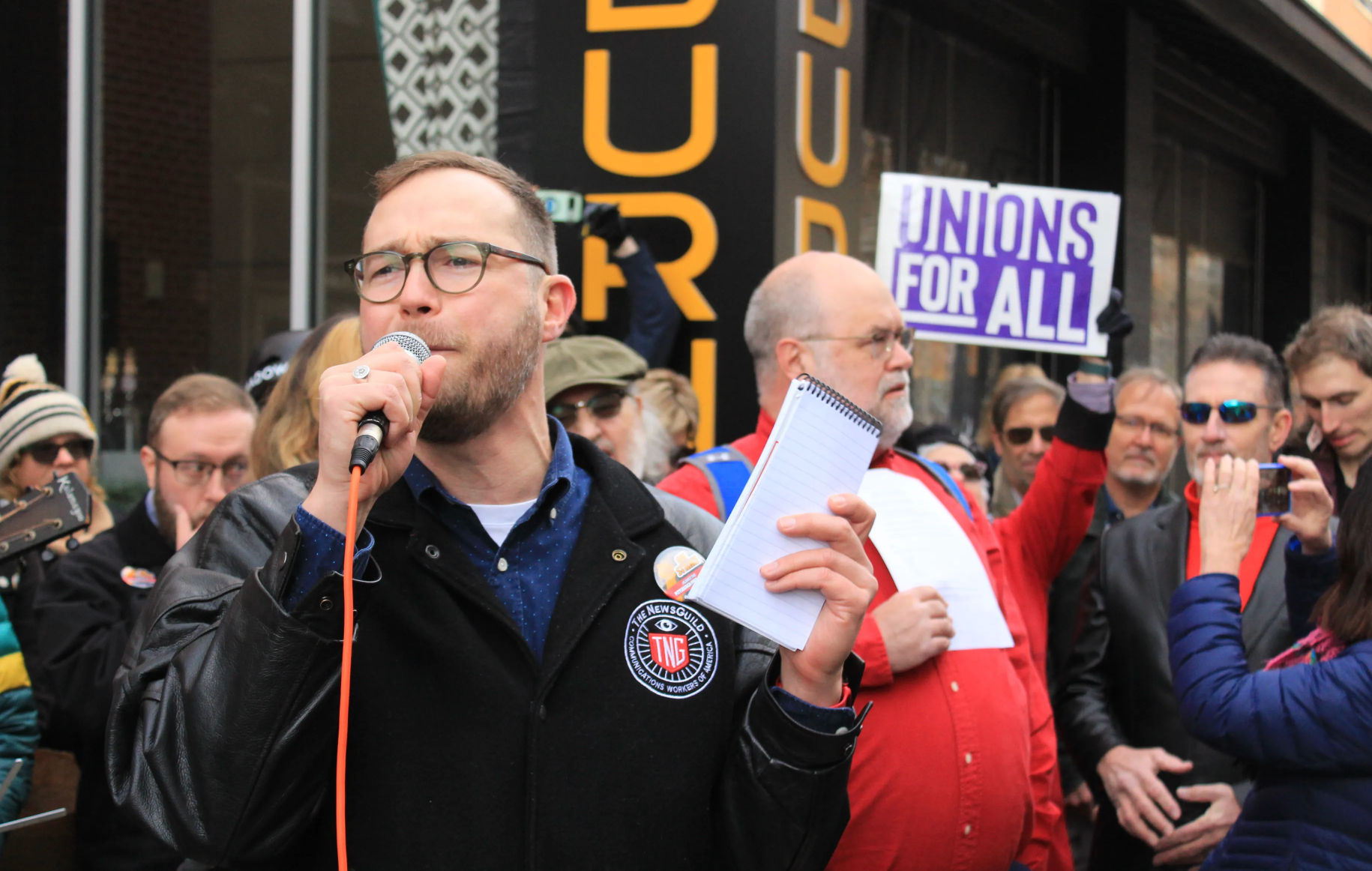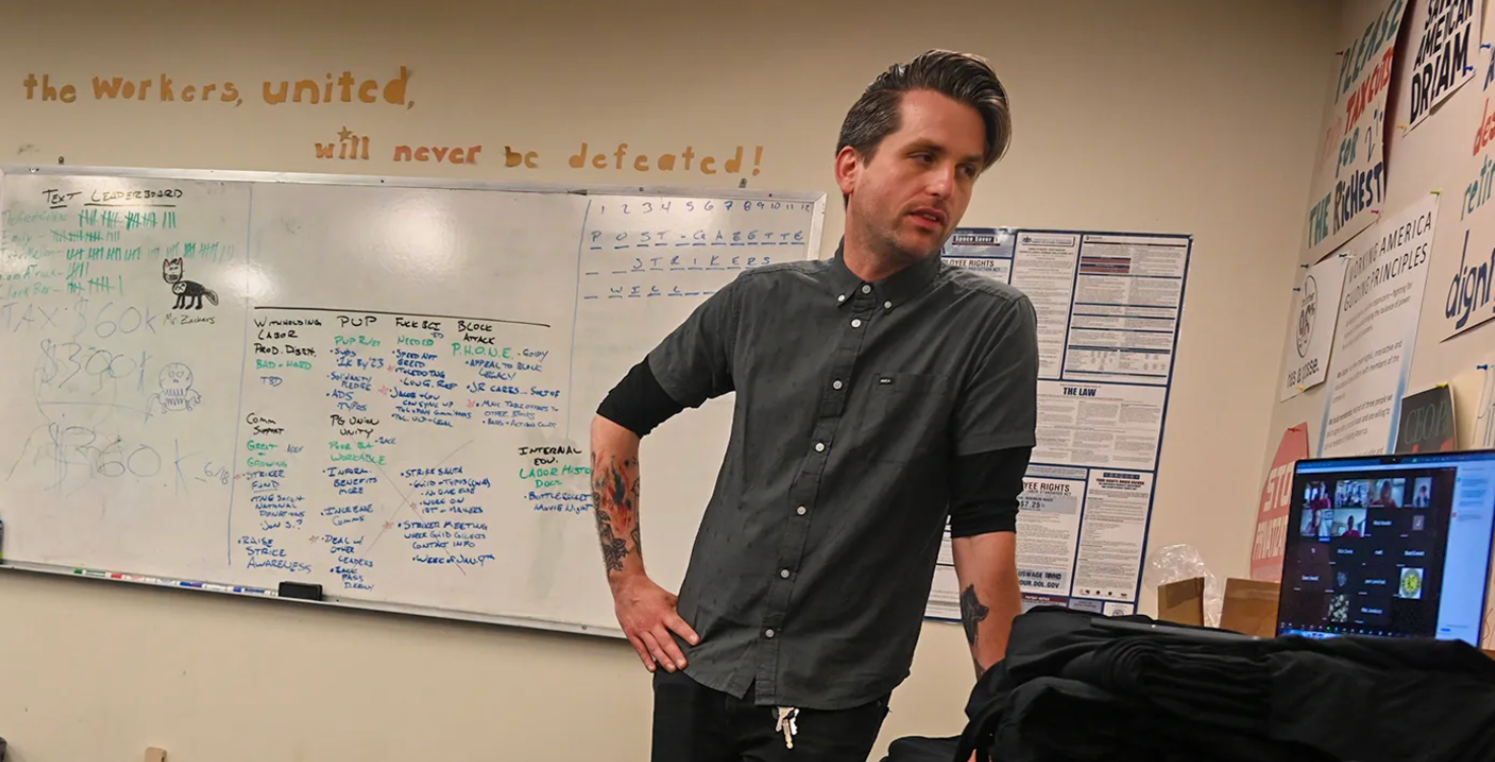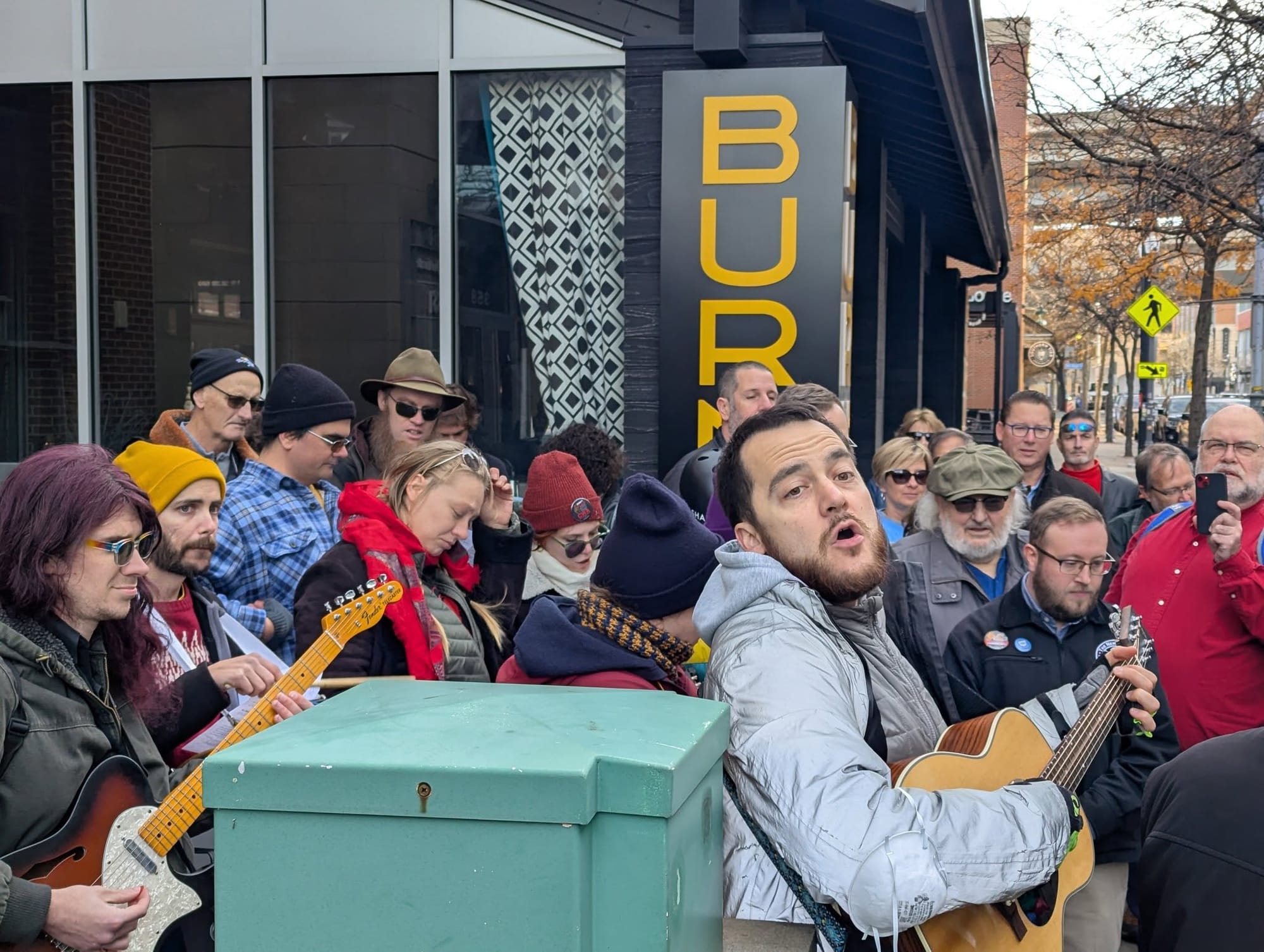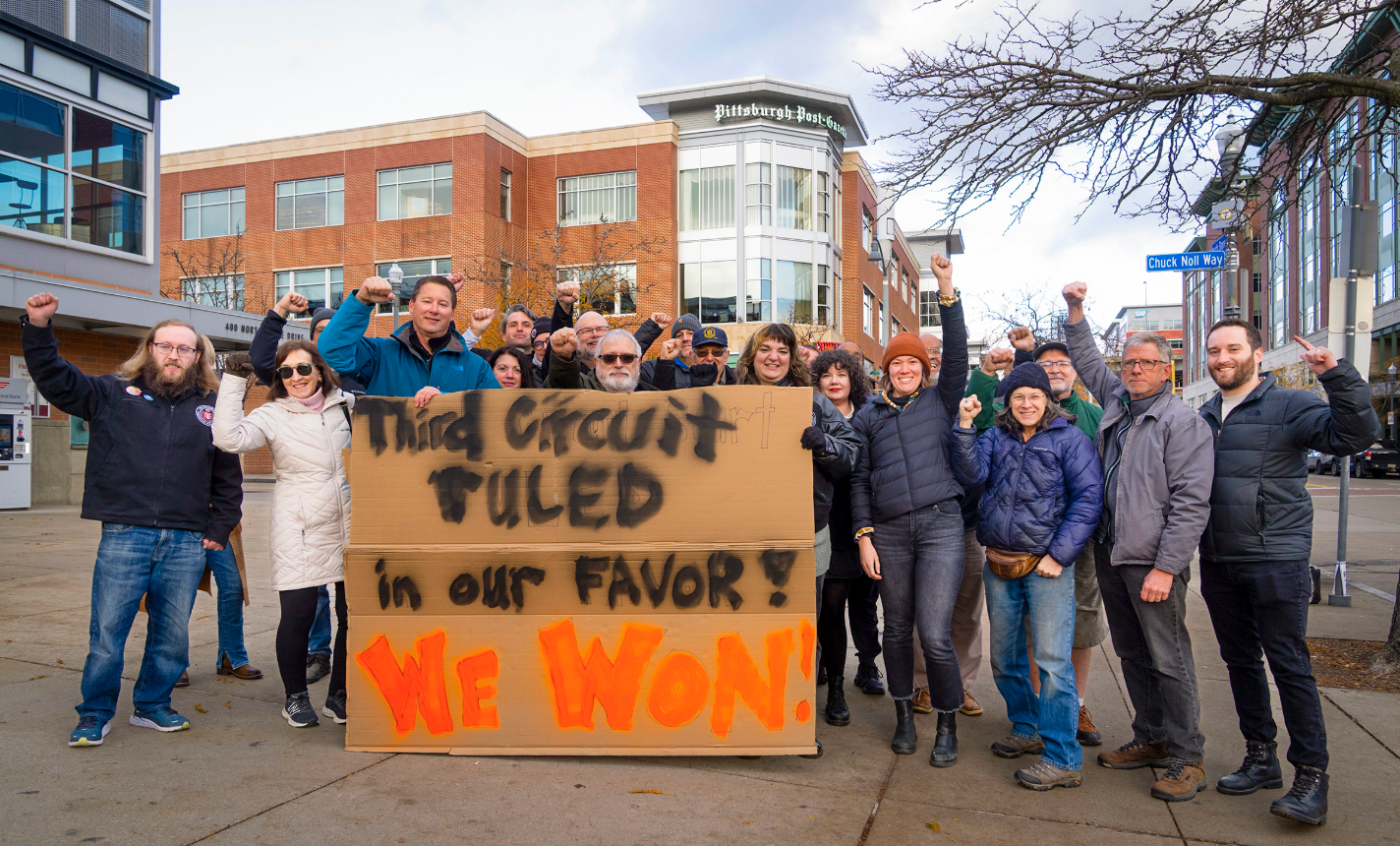PITTSBURGH, PA. - Following the ending of the three-year strike at the Pittsburgh Post-Gazette, there were many headlines and tweets from labor activists declaring a monumental victory.
As a veteran labor reporter, the one thing I have learned is that the first rule of union PR is that every strike ends in a victory, no matter the outcome. In some ways, there is some truth to this; strikes are a bold act of self-determination. The courage of striking workers to take on uphill, outgunned battles against corporate forces often inspires others to organize.
However, a desire to declare "victory" at the end of every strike leads the labor movement away from reflection and self-examination.
At the Pittsburgh Post-Gazette, the majority of workers in the newsroom chose to cross the picket line following a nasty sexual misconduct scandal in the union's ranks. The strike's ending raises fundamental questions about how the Pittsburgh NewsGuild rebuilds trust and regains majority status at Pittsburgh's marquee newspaper.
NewsGuild Ends Longest Current Strike in US
Yesterday, after more than 3 years on strike, 25 unionized reporters at the Pittsburgh Post-Gazette returned to work without conditions.
The decision to return to work comes after a federal court ruled earlier this month that the Pittsburgh Post-Gazette must reinstate the old union contract, reversing wage cuts, health care premium increases, and cuts to paid time off. The union hailed the ruling as a decisive victory, posting on its website, "Post-Gazette Strikers Win Three-Year Strike."
It's unclear, though, if it's truly the end of the strike, as the company has vowed to appeal the ruling and has not reinstated any terms of the contract.
Equally troubling, when the union went on strike 3 years ago, nearly all of the newsroom's 100 journalists were members of the union. Now, the 25 unionized journalists will be forced to work alongside approximately 80 non-union journalists, as the company has not agreed to closed-shop union security.
Under federal labor law, the Post-Gazette would be required to dismiss any reporters who were hired to replace striking workers if a striking reporter returned to their job. However, many union journalists at the paper who went on strike for 3 years have taken other jobs and indicated they don't want to return to work at the anti-union employer.
Additionally, the Post-Gazette could refuse to rehire a striking worker if their job had been permanently eliminated, something that routinely happens at the constantly downsizing newspaper.
Ernest Orsatti is a veteran union lawyer who worked as an attorney for the NewsGuild for more than a decade, but has not worked on the current case. He says there is still a lot to be resolved between the company and the union.
In interviews both with Payday Report and local NPR affiliate WESA, Orsatti questioned why the union would return before these issues were resolved.
"Once you return to work, you lose your leverage. Striking is a union's only weapon in the economic battle with an employer, and once you return to work, a union doesn't have any leverage,” said Osratti.
However, Orsatti praised the union's attorney, Joe Pass, a former co-worker, and said he hoped the union would resolve these issues.
"I hope it will be resolved, and that the parties do come with some sort of an understanding or agreement soon, but I'm not tremendously optimistic," said Orsatti, citing the limitations of federal law and anti-union animosity of the employer.
While it's unclear what the exact terms of a settlement between the union and the newspaper will be in this situation, it's clear that there will be tension as returning striking workers join non-union workers in the newsroom. Additionally, there will likely be negotiations within the union over whether those who resigned and crossed the picket line will be allowed to rejoin.
"I'm under no pretense this is going to be easy," Pittsburgh NewsGuild President Andrew Goldstein said at a rally earlier on Monday. "People are people. We are all human. We all have strong feelings on many things, especially this."
NewsGuild Admits Mistakes in Strike at Pittsburgh Post-Gazette Strike
Typically, when unions go on strike, they do so with at least 85% of their bargaining unit voting to strike to avoid workers crossing the picket line. In October of 2022, the Pittsburgh NewsGuild voted to strike by a tally of 38-36, or 51%
The decision came after the Pittsburgh Post-Gazette unilaterally stripped production and delivery workers of their healthcare benefits. The workers, who belonged to four different bargaining units that were part of both the Teamsters and the NewsGuild’s parent union, Communication Workers of America, had little choice but to strike.
However, the reporters at the Post-Gazette were not stripped of their healthcare, and support for the union was low following a major sexual misconduct coverup scandal that implicated local leadership and drew national attention.
In the lead-up to the decision to strike, the Communication Workers of America international leadership repeatedly threatened to take over its affiliate, the NewsGuild, and remove its leadership if the reporters did not choose to strike.
Faced with such top-down tactics from the international leadership and distrust over the locals’ handling of sexual misconduct scandals, nearly three dozen reporters wrote an open letter denouncing the international union for pushing the strike and explaining their reasons to cross the picket line.
"This vote was taken under the pressure of the Communications Workers of America, which threatened to unilaterally impose a strike on the local and remove its leadership if the vote did not conform to its wishes," the group said in a statement in October of 2022.
On the first day of the strike, nearly half of the union crossed the picket line, allowing the Pittsburgh Post-Gazette, which published only two print copies per week, to maintain a strong online presence by using scabs and news wire service articles.
In an interview this week with Harvard's Nieman Foundation for Journalism, the 37-year-old NewsGuild-CWA President Jon Schleuss admitted that the union had learned a hard lesson in calling for a strike with such narrow support.
"You want every single person to walk out," Schleuss told Harvard's Neiman Center this week. "If [that had happened in Pittsburgh] on day one, this wouldn't have been a three-year strike waiting for a court ruling. Pittsburgh was a bit of a unique situation. People were quite rushed into the situation of making the decision to go on strike. You need to make sure that there's a plan and a process."
Union Leadership Covered Up a Major Sexual Misconduct Scandal & Hurt the Union

While Schleuss admitted that it wasn't smart to call a strike with so little support, he has not admitted that his role in covering up sexual misconduct by the union's longtime president, Michael Fuoco (who resigned in 2020), may have played a role in decreasing enthusiasm for the union. Fuoco's sexual misconduct and coercion of young female journalists was so prolific that The New York Times labeled him "Pittsburgh’s Harvey Weinstein."
In December of 2019, I informed Schleuss in a meeting at DC's Union Station of severe sexual misconduct accusations against longtime Pittsburgh NewsGuild President Michael Fuoco, who had served as the head of the union at the Post-Gazette for nearly two decades.
As a shop floor newsroom NewsGuild union leader, I had been involved in the NewsGuild for more than a decade. I successfully led a union drive at In These Times, helped found the union at POLITICO, and knew that the Pittsburgh NewsGuild faced a very difficult fight ahead. I worried deeply about what could happen to the union in my hometown, Pittsburgh, where I was based, if Fuoco was not removed.
Repeatedly, I warned Schleuss for nearly a year that Fuoco's unsavory, widely known notoriety prevented many members from getting involved in the union, which appeared to be heading toward a strike.
Through the union's confidential sexual harassment reporting system, I showed Schleuss written evidence that Fuoco had been accused of sexual misconduct. I even referred Schleuss to a sexual harassment specialist who could help survivors feel more comfortable coming forward.
Repeatedly in emails, I warned Scheluss that by not removing Fuoco, the union was risking a situation in which a crucial number of Pittsburgh Post-Gazette reporters would not support the union or follow it into a strike.
Despite such grave warnings, Schleuss refused to launch a formal investigation of Fuoco for nearly a year.
Finally, in September of 2020, I published two articles detailing how Fuoco regularly engaged in sexual misconduct, including using cocaine to lure young prospective interns into sexual encounters. (Fuoco has since died of a cocaine overdose in April of 2025 at the age of 73.)
In September of 2020, I attempted to interview Schleuss at a rally for the Post-Gazette about the widely documented sexual misconduct. While seeking an interview, one of Fuoco's deputies in the union leadership, Zack Tanner (who would later lead the union as president through much of the strike), repeatedly punched me in the stomach. Then, Tanner had several union members surrounding me in a circle and threatened to beat me up if I didn't leave the rally.
After watching a video of Tanner’s assault on me, a sexual misconduct survivor of Fuoco's came to the New York Times with legal documents proving that Fuoco had fathered a child with her when she was an intern at the Pittsburgh Post-Gazette.
Finally, only after New York Times media reporter Ben Smith began asking why Schleuss had refused to launch a formal investigation into Fuoco did Schleuss take action, forcing Fuoco to step down in September of 2020.
However, much of the union leadership that overlooked Fuoco's widely known sexual misconduct continued to lead the union during the strike, leaving a bad taste in many workers' mouths.
University of Texas Professor Robert Prentice studied the case and concluded that the power structures of the Pittsburgh NewsGuild, under both Michael Fuoco and his protege Zack Tanner, were set up in such a way as to reward those who covered up sexual misconduct. With the union facing a serious threat from a union-busting employer, Prentice found that many union members were unwilling to say anything out of fear of being seen as betraying solidarity.
"The active participants were drawn into the network, influenced by the harasser's power, charisma, and ability to control and shape information. They often protected the harasser by making excuses, shielding them from criticism, and sabotaging victims who complained," wrote Prentice in 2021. "Passive enablers tended to turn a blind eye to the harassing behavior, making light of it or rationalizing it."
Overturned Union Election for Fuoco's Replacement
Following Fuoco's resignation, it was assumed that longtime Pittsburgh NewsGuild Vice President Ed Blazina would take the reins of the union. In an interview with The New York Times, Blazina angered many when he joked that he never knew about Fuoco's sexual misconduct, saying, "I can tell you — [Fuoco] wasn't handsy with me."
A union election was held in November 2020 to select a successor. In the election, 28-year-old Black reporter Lacretia Wimbley defeated longtime Fuoco ally Melissa Tkach by only three ballots to be elected President of the Pittsburgh NewsGuild.
Fuoco allies, including Pittsburgh NewsGuild Vice President Ed Blazina, raised objections to the election results. They alleged that the election was conducted improperly in violation of federal law because 30 ballots were returned without an address attached, forcing the union to hold a re-vote.
The overturned election angered many reporters at the union, who were outraged by the union's coverup of sexual misconduct.
"On the same day the guild sends out a statement demanding more diversity in the newsroom, it removes an African-American woman as its president," Mark Belko, a real estate reporter, wrote in an email to other members, which was obtained by The New York Times.
Belko, who had once been a union member, later crossed the picket line during the strike.
(For more, read The New York Times expose "A Powerful Reporter Got Away With Sexual Misconduct for Decades. His Paper, and His Union, Looked the Other Way", which cites the investigative work of Payday Report extensively.)
Union Refuses to Conduct an Independent Investigation of Sexual Misconduct
Eventually, Wimbley prevailed and won the re-run to lead the union at the Pittsburgh Post-Gazette. Both Wimbley and Schleuss promised to conduct an independent investigation into how the sexual misconduct scandal was handled. However, no independent investigation was ever conducted, further eroding the union's leadership's credibility with the rank and file.
The NewsGuild released an internal report, which paled in comparison to the efforts of other unions facing similar sexual misconduct problems. It lacked contributions from qualified sexual harassment experts or independent lawyers.
In a comparable situation in March of 2020, when American Federation of Government Employees President J. David Cox was forced to resign over sexual misconduct allegations in February 2020, the union brought in the Working IDEAL group — a group of lawyers and HR professionals led by former US Equal Employment Opportunity Commission Chair Jenny Yang, who later produced a 51-page independent report into the problems of sexual misconduct at AFGE.
At NewsGuild, Schleuss hired the "independent consultant" Rebecca Feaster, who has no law degree or experience conducting such investigations, as the lead consultant on the report.
According to Feaster's LinkedIn, her primary work experience had been in "crisis communication" and "brand management," working as a communications specialist on behalf of police unions and other controversial organizations, including the US Chiefs of Police Association and the National Sheriffs’ Association.
In email exchanges with Payday Report, Feaster admitted that rather than being allowed to choose who she wanted to interview on her own and release the report on her own, she reported to a group of NewsGuild leaders called the "Listening Tour Task Force," which was set up in the wake of The New York Times exposé. Schluess, despite being implicated in the cover up, personally lead this “listening task force”.
(For more, see our October 2021 expose "NewsGuild Shelves Sexual Misconduct Inquiry Written by Cop Union PR Specialist")
Violent Threats Against Union Dissidents and The "Terror of Tanner"

Less than a year later, in 2022, Wimbley left the Pittsburgh Post-Gazette to take a job with Colorado Public Radio. As a result, a new union election was held, and Zack Tanner was elected president of the Pittsburgh NewsGuild.
Tanner was a divisive choice. He had been seen as a top Fuoco ally within the union. Many considered Tanner a bully, who would get overly aggressive and sometimes violent when people disagreed with him. He threatened and cajoled many union members, including physically attacking me when I confronted Schleuss in 2020.
In 2023, the Pittsburgh NewsGuild was forced to pay a legal settlement to me over Tanner’s assault and emails depicting how he wanted me murdered and raped. The union only paid the money after the legal case had made it through dismissal and was headed towards legally-sworn depositions. I donated the entire settlement to the immigrant defense network Casa San Jose, a group which many unions and their allies in Pittsburgh support.
Despite the violent incident with Tanner and Fuoco's allies, I still supported the strike because I believe the Post-Gazette's decision to unilaterally strip the delivery and production workers of their health care was immoral.
My publication, Payday Report, was very public in my support, refusing to cite or link to the Post-Gazette during the three-year strike. I also wrote major exposes of CBS News Editor Bari Weiss and Pittsburgh's incoming Mayor Corey O'Connor for crossing the picket line.
Despite numerous warnings about Tanner, he remained president of the union for nearly three years. During that time, over 80 workers crossed the picket line including 35 of the union’s former members.
In December of 2024, Semafor reported that Pittsburgh NewsGuild President Zack Tanner was arrested for yet another violent incident. In a fit of violent rage, Tanner threw a chair into a wall at a hotel in downtown Pittsburgh during a bargaining session with company lawyers present, creating a large hole in the wall. The incident received widespread coverage in the local press and damaged the union's credibility.
Following the incident, Tanner stepped down as president of the union. Thirty three-year-old Andrew Goldstein took over the presidency of the Pittsburgh NewsGuild, allowing the union to distance itself from the scandals of Fuoco and his successors.
A New Day for the NewsGuild in Pittsburgh?

On Monday, Goldstein led a celebratory rally at the Pittsburgh Post-Gazette as 25 unionized journalists returned to work, declaring that the union had won the strike.
"It's been three long years, but we are really excited to finally end it," Goldstein declared at the rally. Despite having led the union for nearly three years during the strike, Tanner was nowhere to be seen.
At the rally, Goldstein pledged that it was a new day for both the NewsGuild and the newspaper and that the union would work cooperatively with the majority of the current Pittsburgh Post-Gazette staff, who had crossed the picket line.
Rather than continue its strike-newspaper, Pittsburgh Union Progress, which published more than 4,000 articles and built an advertiser base of unions, the union pledged to shut it down. Instead of running a competing union-funded newspaper, they would focus on rebuilding the Pittsburgh Post-Gazette.
" We have to act as one team," Goldstein said. "We all are here to serve the people of Pittsburgh and Southwestern Pennsylvania. And sure it's going to be awkward, it's going to be difficult. No one's under any pretense that there's not gonna be many challenges still ahead for us."
In an interview with Harvard's Nieman Foundation yesterday, strike leader Steve Mellon said the union would have to work hard to heal divisions with those who crossed the picket line.
"There are people who did not strike that were good friends of mine long before October 18, 2022. I watched their kids grow up. They watched my kids when my kids were young," said Mellon. "We're going to have to talk about these things, work through them — maybe even vent at each other — and then give each other some grace. We have to give each other some grace. There's not a magic bullet. We're going to have to struggle through this."
Photo credit at top: CWA-NewsGuild

